#crucified Tuesday
Text

22 notes
·
View notes
Note
lola we’ll get through this senioritis together . i think im starting to understand why my friends have over 50 absences
holding my head and shaking. okay
#lolaa.txt#i have over 50 absences and i still would rather be crucified than go to school tuesday ^^^^^^^^^^^^^^^^^^^^^^^^^^^^^^^^^^^^^^^^^^^^^^^^^^^
4 notes
·
View notes
Photo
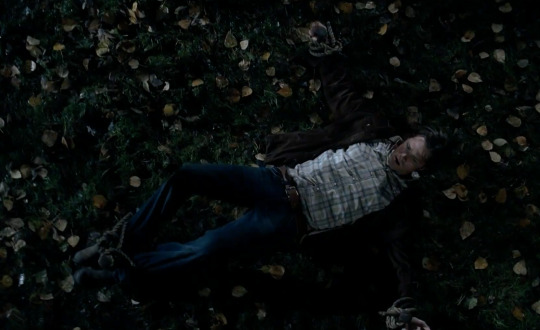
WHICH COULD MEAN NOTHING
18 notes
·
View notes
Note
Is it true that Friday the 13th was a day of veneration to Freyja before the church started associating it with the devil?
Edit: Made one mistake in the original reply; Friday is named after Frigg, not Freyja! So this is edited to fix that.
So the thing about all of these cutesy little "did you know X has pagan origins??" memes, is that pretty much all of them are basically wrong. They tend to come about because people just kind of assume that if something doesn't have a Biblical basis, then it must be a carryover from pre-Christian paganism. People have spun all kinds of conspiracy theories out of this.
Moreover, many people have attempted to find a historical basis for the allegations made during Europe's pre-Christian witch trials, proposing that accused witches were actually cryptopagans gathering in the woods to worship some pre-Christian deity. In reality, the accusations were based on what Christians of the day imagined paganism to be like based on centuries of demonization: orgiastic, violent, and ultimately satanic; as well as a full-blown mockery of Christianity. Within the logic of the witch panic, if Christians have a sacred day of worship, then witches must also have a sacred day of worship - just evil. It's important to note here that Christians believe that Jesus was crucified on a Friday.
If we look at Wikipedia's article on the witches' sabbath, we can see that the idea of the witches' sabbath isn't extraordinarily old; in fact, it's a product of Europe's witch panic.
Also, Friday isn't named after Freyja; it's named after Frigg. And the whole claim that Freyja was worshiped on Fridays because Friday is named after her shows ignorance of the actual reason why the days are named the way they are. The whole thing actually goes back to ancient Rome. Sunday was dies Solis (day of the sun), Monday was dies Lunae (day of the moon), Tuesday was dies Martis (day of Mars), Wednesday was dies Mercurii (day of Mercury), Thursday was dies Iovis (day of Jupiter), Friday was dies Veneris (day of Venus), and Saturday was dies Saturni (day of Saturn).
The Romans, of course, were big on the idea that everybody else's gods were actually the same as their own. They associated Tyr with Mars, Odin with Mercury, and Thor with Jupiter - do you see where this is going? Friday got named after Frigg because in the Roman way of looking at things, Frigg is just the Norse version of Venus.
Finally, as far as I am aware, Freyja was never historically linked to the number thirteen, either. Every page I can find linking Freyja with the number thirteen is repeating the claim that Freyja was venerated on Fridays, and offers no explanation of why Freyja was associated with the number thirteen. If you look into myths about Freyja, you won't find her associated with thirteen of anything - and it would be very strange if you did, because the main sacred numbers in Scandinavian thinking were three and nine (three times three).
On the other hand, thirteen is an important number to Christians. Jesus plus the apostles made thirteen. The thirteen of them gathered at Passover shortly before Judas betrayed Jesus.
In conclusion, Friday the 13th has nothing to do with Freyja; this whole idea that it was historically associated with her is nothing more than a post-Christian conspiracy theory.
#freyja#friday the 13th#friday the thirteenth#history#pseudohistory#conspiracy theories#conspiracy theory#conspiracism
103 notes
·
View notes
Text
Deliverance
CW: Canon-typical violence, medical torture
@forgivenpunishment | @misplacedreporter

Days blur together in a haze of drugs and procedures, all far from the heat and light of the suns. Out of sight, out of reach. The Eye of Michael stronghold is, like all others, a maze of corridors, a warren of cells built in the bones of a ship that once touched the stars. At its heart, the surgical rooms are anything but welcoming, but they are extensive.
They are watching. Always. There are always eyes on their subjects of interest. Every mirror, every window, every pane of glass, every light fixture. They are listening. Meryl and Nicholas have no privacy. They are not looked on as humans, they are not spoken to unless it is to relay an instruction. The only hint of a schedule has been 'feeding' time, guard rotations never consistent enough to draw a bead on beyond 'overwhelming force.'
Neither of them were warned that the floors are electrified. Nicholas likely remembered from his initial stint with the Eye; it is why the scientists' catwalks are elevated in this prisoner panopticon, and why subjects are never allowed footwear.
That hardly matters here and now.
They are crucified in the same operating theater, white lights glaring down from overhead. A pair of armed guards flank the door outside, leaving Conrad alone with the both of them to check his notes as though this is just another Tuesday afternoon for him. Maybe it is.
What he does not know is that the cube is restless. That it is interconnected, intelligent enough to dodge his energy readers. That it can sense the proximity of another presence, a ping like sonar in the long-lost oceans of their species' cradle.
"...subjects display remarkable resilience. Higher Dimensional readings remain steady at baseline and peak under stimulation. Commencing stimuli test bank zero-one-seven, timestamp 17-15-00."
#verse: wayward wolf#sing another song of how you think you're gonna live forever -- misplacedreporter#we're witness to tragedy; difference in memory - we all fall the same -- forgivenpunishment
45 notes
·
View notes
Text
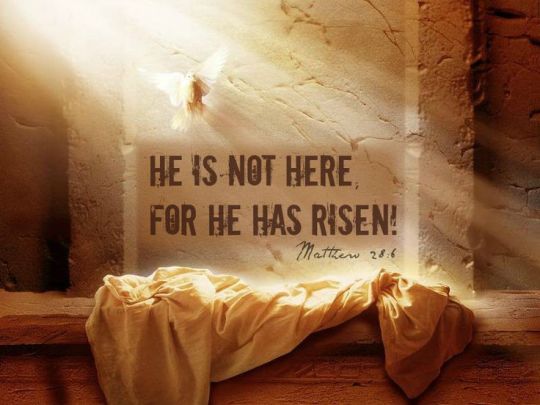
“The angel said to the women, “Do not be afraid; for I know that you are looking for Jesus who has been crucified. He is not here, for He has risen, just as He said. Come, see the place where He was lying.” —Matthew 28:5-6 (NASB)
“Saturday evening, when the Sabbath ended, Mary Magdalene, Mary the mother of James, and Salome went out and purchased burial spices so they could anoint Jesus’ body. Very early on Sunday morning, just at sunrise, they went to the tomb. On the way they were asking each other, “Who will roll away the stone for us from the entrance to the tomb?” But as they arrived, they looked up and saw that the stone, which was very large, had already been rolled aside. When they entered the tomb, they saw a young man clothed in a white robe sitting on the right side. The women were shocked, but the angel said, “Don’t be alarmed. You are looking for Jesus of Nazareth, who was crucified. He isn’t here! He is risen from the dead! Look, this is where they laid his body. Now go and tell his disciples, including Peter, that Jesus is going ahead of you to Galilee. You will see him there, just as he told you before he died.” The women fled from the tomb, trembling and bewildered, and they said nothing to anyone because they were too frightened.” —Mark 16:1-8 (NLT)
“Easter Explained: An 8-Day Guide to Celebrating Holy Week.” A Devotional By Spoken Gospel - Day 8: “Easter Sunday”:
“For the last 1,600 years, Christians around the world remember the last days of Jesus' life during Holy Week. Today is Resurrection Sunday. Easter Sunday remembers the day Jesus was raised from the dead.
After being executed as a threat to Roman and Jewish power, Jesus laid in his grave for two full nights. For two full nights Jesus' disciples, followers, and family wept. For two full nights the schemes of Rome, corrupt religion, and darkness seemed to have won...until there was an earthquake. And an angel dressed in white appeared, rolled back the stone covering Jesus' tomb, and scared the guards away (Matthew 28:2-3).
At sunrise, a group of women approach Jesus' tomb to embalm his body (Mark 16:1-2). But as they approach, they see that Jesus' tomb has been opened (Mark 16:4). And inside the tomb is an angel dressed in white. He tells them, 'Don't be alarmed...You are looking for Jesus the Nazarene, who was crucified. He has risen! He is not here. See the place where they laid him' (Mark 16:6). The angel then tells these women to leave the cemetery and tell Jesus' disciples what they have seen: Jesus is alive!
But before they could get far, Jesus appears and they immediately bow before their King (Matthew 28:8-9). With his grave behind him, Jesus is now the King of both Life and Death. And he remains the only person in human history to have risen from the dead, never to die again. Later, Jesus tells his disciples that he has been given all authority in heaven and on earth and that he is with them (Matthew 28:18). He then sends them out to make new disciples and citizens of his Kingdom, just before he ascends into the clouds and takes his throne at God's right hand (Luke 24:51-52).
Holy Week doesn't simply remember the final week of Jesus' life, but the days leading to Jesus' coronation and enthronement. On Palm Sunday Jesus rode into Jerusalem like a rival king. He challenged the power structure of the temple on Monday and invited others into his rebellion on Tuesday. On Wednesday Jesus was anointed with perfumed oil, like his forefather King David. Like a monarch, on Thursday he announced a New Covenant treaty with God. And on Friday Jesus was killed as 'King of Jews' in a battle with death. But Resurrection Sunday is good news because it is the day Jesus is raised from the dead and is enthroned over all other nations, powers, and rulers. Jesus is the true King of the world, life, and death, just as he claimed to be.
When people came into contact with the resurrected Jesus, almost everyone responded the same way - they were all terrified. The soldiers guarding the tomb fell down as if dead. The women at the tomb cowered. Jesus needed to tell his own disciples not to be alarmed. The religious elite didn't even believe Jesus rose from the dead, but were still scared that others believed it! And in one sense, this is the most appropriate response to a King who can wrestle death and win. But another response to Jesus' enthronement is to run and tell others that good news.
So I pray that on this Easter Sunday you will accept the good news that Jesus has risen from the dead as the world's only resurrected King and run to tell others the good news as well.”
#matthew 28:5-6#mark 16:1-8#bible#christian blog#god#belief in god#faith in god#jesus#belief in jesus#faith in jesus#bible verses#bible truths#bible scriptures#bible quotes#bible study#christian life#christian faith#christian living#christian inspiration#christianity#christian encouragement#christian motivation#christian quotes#easter#easter sunday#crucifixion#resurrection#keep the faith#make him known#youversion
109 notes
·
View notes
Text
as a jew ive always been really confused by easter but ive never been more confused than when I joined the tlt fandom. Wtf are the stations of the cross. Why would harrowhark like them. Why is friday good. What are those ash forehead things for. Is today leaves day? I know about the rock tomb thing connection that's about it. And obviously gid's resurrection is jesus. I get that. She has the wounds to prove it and the lil crown yeah I know. Also she was crucified. I get that! But the crucifixion. ... is that an easter thing? Do yall have a sad day? Like i dunno like. Depression tuesday? When did this man die? Is it the same day every year? If tlt is the bible if the bible snorted homestuck wtf happens next?
#genuinely help#all the religious stuff i get in tlt is bc it's torah too like sefer rut#tlt#lessons of the hand and the mouth
11 notes
·
View notes
Text
sorry for not showing up i was busy being crucified forever in the heart of the world. i'm free after tuesday though
56 notes
·
View notes
Text
IT'S TUESDAY
CRUCIFY THEM

5 notes
·
View notes
Text
You really have to admire the Democratic Mayor’s commitment to diversity. She made sure to only allow elected people of color, making sure that none of those white people were allowed to come.
I mean, who wants to have a party where everyone shows up? Because that’s what she could have done when she realized her staffer made a mistake. But no, her staff, presumably with her mayoral approval, disinvited the white council members.
Because after all, isn’t that what the whole DEI plan is about? Instituting segregation and making sure that groups you don’t like get excluded. If it were done by white people, it would be rightly called segregation and heads would roll. But in these enlightened times, if it’s done by someone with a DEI sounding title it’s “woke” and just and if you complain about it you’re a racist.
Had Mayor Menino done this, he would have been crucified and forced to resign. Mayor Wu should, but she absolutely zero shame.
She’s been comfortable with being discriminatory on the basis of race. Her policies favored other groups and seemingly targeted Italian American restaurant owners. Her administration set the fee for outdoor dining in most of Boston at a max of $399. For those in the North End, $7,500. When they complained, she ended outdoor dining in North End.
Interestingly, since the mayor is attending, she is clearly making a bid to have Asian Americans reclassified as people of color instead of the “white adjacent” that lead, in part, to Harvard discriminating against them.
Boston, home to a bigoted mayor, next to a cesspool of antisemitism and bigotry at Harvard. They deserve each other.
7 notes
·
View notes
Text
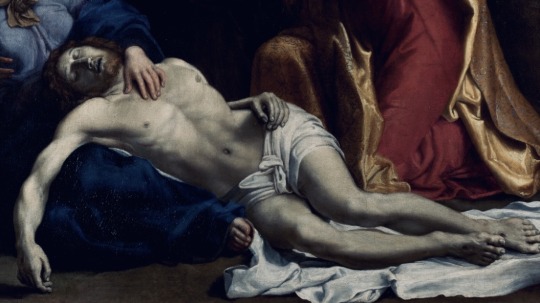
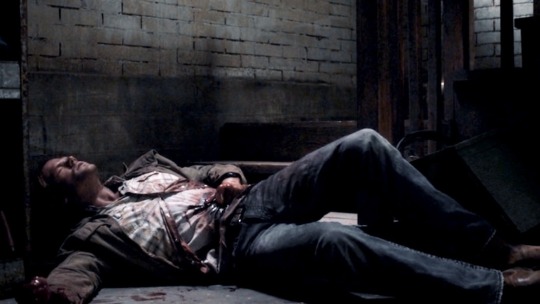

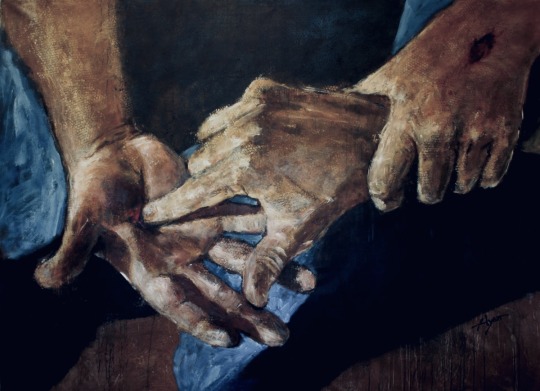
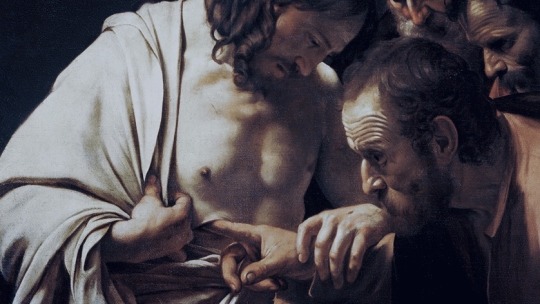

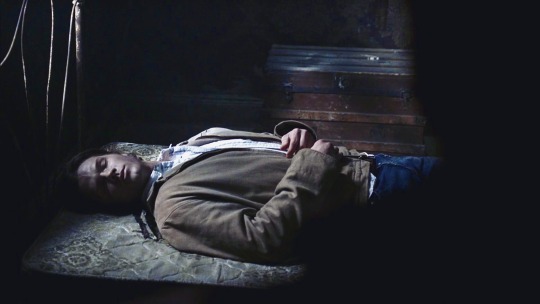
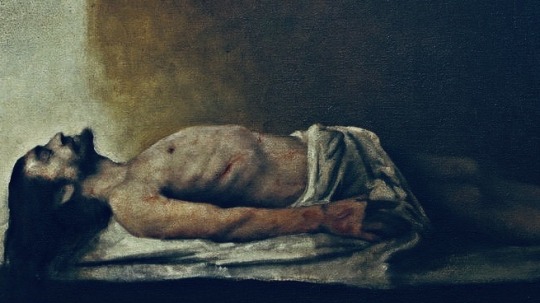
“If you ever, by the grace of God, become a partaker of the divine nature you must also inevitably become a partaker of His sufferings.” -Clovis G. Chappell
#crucified Tuesday#spn#supernatural#sam winchester#my edit#my edits#spn edit#spn edits#supernatural edits#religious imagery
214 notes
·
View notes
Text
10 Exciting Facts About Easter Sunday
By: Shash Wighton
Updated: 3 December 2022
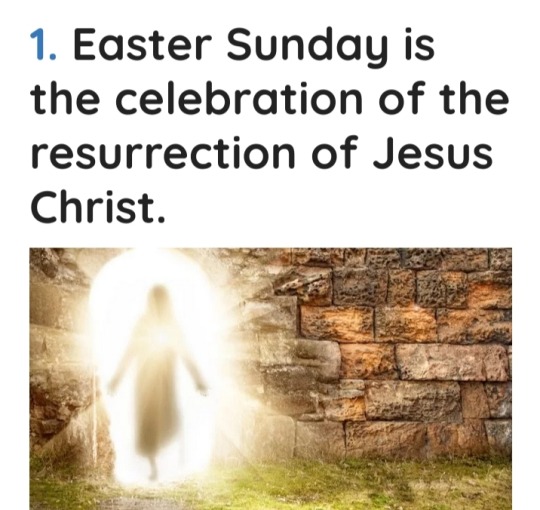
For those who grew up without much religion in their lives, Easter Sunday was more about chocolate Easter eggs and little more than that.
This day means much more to Christians, though, with some preferring to call it “Resurrection Sunday.”
This is because the New Testament describes Easter Sunday as the day that Jesus Christ rose from the dead, three days after he had been crucified by the Romans all the way back in 30 AD.

Easter has got to be one of the most confusing celebrations held throughout the year due to this fact, but we’re here to clear this up for you.
First, let’s go into why this happens in the first place.
As we now all know, Easter Sunday is connected to the resurrection of Jesus Christ.
This gets a little complicated, as this event was only recorded in the Jewish calendar that happened just after the Jewish festival of Passover.
The Jewish calendar doesn’t sync up with the Gregorian calendar, which most of the world relies upon, as it’s based on lunar cycles rather than the movements of the sun.
While a solar year contains 365.24 days, a lunar year only contains about 354.
The date of Passover also changes, as it takes place on the first Sunday after the first full moon after the 20th of March, which also ultimately affects the date Easter Sunday lands on.
Obviously, it is still possible to calculate what date Easter Sunday will fall on, but it involves a bit of maths and the consultation of charts, so we won’t bore you with that and instead suggest you simply Google it!

Not just in English, either, as the Dutch and German for Easter are Ooster and Ostern, respectively.
In Old English, the celebration was usually recorded as Ēastrun, Ēastre, Ēastru, or Ēostre.
The origin of Easter’s name doesn’t stop there, though.
In 725, Saint Bede, a Benedictine monk in the old English kingdom of Northumbria, wrote that the name is connected to the pagan goddess Ēostre.
Feasts were celebrated in honor of Ēostre in Ēosturmōnaþ (Month of Ēostre), which is the equivalent to April today.
At some point, the Pagan goddess’ name was appropriated by Christians for the name of Easter Sunday.

Like Easter Sunday, Good Friday also has a couple of other names, including Great Friday, Holy Friday, and even Great and Holy Friday.
Just like Easter Sunday, Good Friday changes date every year due to its connection to Jesus Christ.
Good Friday commemorates the day when Christ was crucified and killed by the Romans.
As Christ’s crucifixion happened a set amount of time before he was resurrected, the date is fixed according to Easter Sunday.
Fun Fact: Good Friday is not named such because the day was a happy day, but because “good” used to be a synonym of “pious” and “holy.”

Many Christians around the world observe the tradition of Lent.
During this period, diligent Christians must give up a Lenten sacrifice (some form of pleasure or luxury) for forty days.
Lent begins on Ash Wednesday and runs until Easter Sunday.
Traditionally, people in the English-speaking world would use up their eggs, dairy, and other richer foods the day before they began a fast for Lent on Ash Wednesday.
Because of this, Shrove Tuesday began to be known as Pancake Day in the UK.
The tradition crossed the channel into France, where it became known as Mardi Gras (which translates to “Fat Tuesday”).
Shrove Tuesday, Fat Tuesday, Mardi Gras, or however you want to call it is the day that slowly evolved into a day where celebrants feast on finer foods, especially on pancakes.

The eating of lamb on this day goes back further than Christ himself, as it is actually connected to the Jewish festival of Passover.
Passover celebrates the emancipation of the Israelites from slavery in Egypt, and at the end of it, a “Passover lamb” is slaughtered and eaten.
The tradition of eating lamb at the end of Passover was likely continued by those who eventually converted to Christianity, and the tradition of eating lamb on Easter Sunday began.
It’s been justified by Christians as the lamb is said to represent Christ’s sacrifice on the cross, but these days many non-religious British families also enjoy a lamb roast on Easter Sunday.
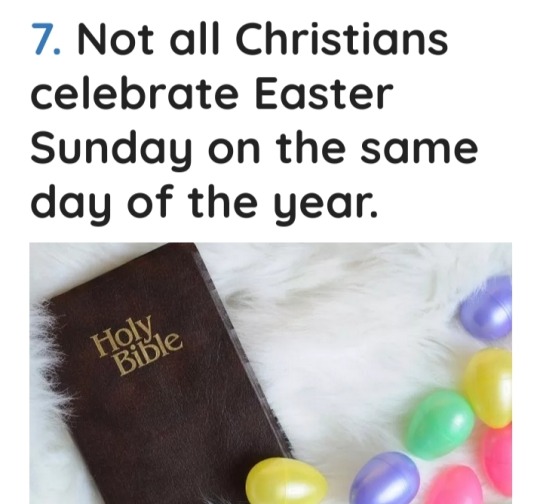
The Eastern Orthodox Church, which includes the Russian and Greek Orthodox Churches, celebrates many similar holidays to other Christians, including Easter Sunday.
For them, it lies on a different date, as events in the Orthodox Church are calculated according to the Julian Calendar, which much of the world used before changing to the current Gregorian calendar in the 16th Century.
So the date is different because of the use of two different calendar systems, but that’s not all.
When the Eastern Orthodox Church was formed, they decided to use a different formula for calculating what day Easter Sunday fell on.
Because of this, there’s actually no set number of days between Easter and Orthodox Easter, with the two occasionally falling on the same day!

These days, it’s not a good Easter Sunday without more chocolate eggs than you should probably eat. However, that hasn’t always been the case and still isn’t in some Christian countries.
Before Easter Sunday was celebrated with chocolate Easter Eggs, people used actual eggs dyed with natural plant dyes and decorated with intricate designs.
This tradition is said to go back to some of the earliest days of Christianity, with the eggs originally dyed red to represent the blood that Christ shed when he was crucified.
Followers of the Greek Orthodox Church still paint their Easter eggs red.
The painting of Easter Eggs is still carried out in most countries with ties to the various Orthodox Christian churches, with chocolate Easter eggs considered a more “Western” notion.
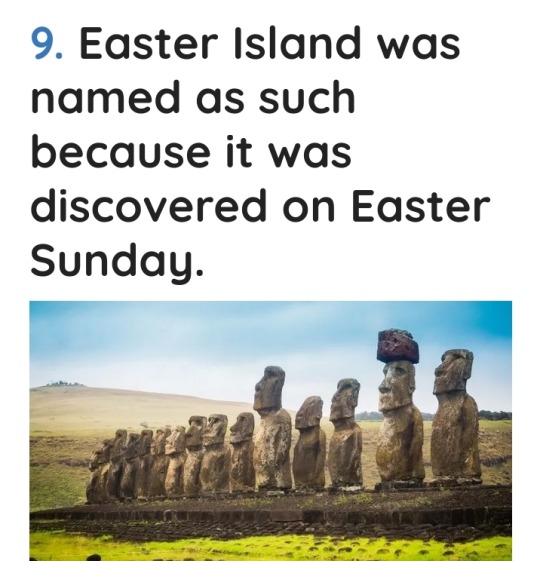
In 1772, Easter Sunday fell on April 5.
It also happened to be the day when Dutch explorer Jacob Roggeveen first set foot on the island, which came to be known in the English-speaking world as Easter Island.
It was already called Rapa Nui by the island’s local inhabitants, but Roggeveen decided to name it after Easter Sunday anyway.
Well, sort of.
He actually named it Paasch-Eyland, which, in 18th-century Dutch, translated to “Easter Island" in English.

As we now know, the date of Easter Sunday is calculated according to a formula that, among other things, takes both the lunar and solar calendars into account.
Because of this, Easter Sunday can be anywhere between March 22 and April 25.
One would easily be forgiven for thinking that any given dates that Easter Sunday land on do not actually repeat themselves in a cycle, as it seems to be different every year.
That’s not exactly true, though.
The specific cycle that it goes through (e.g., April 1 in 2018, April 21 in 2019, April 12 in 2020, and so on) has so many factors affecting it that it takes a mind-bending 5.7 million years to repeat itself.
#Easter Sunday#Easter#Resurrection Sunday#Easter 2023#Good Friday#Lent#Passover#Holy Week#Passover lamb
28 notes
·
View notes
Text
Full Moon in Pisces (8.30.23) - Savior Complex

So, the Full Moon is in Pisces right now and my favorite artist's birthday was yesterday, so I'm dealing with a lot of feelings. I was encouraged to share them by @adapembroke and we've been trying to get me to post more, so here's hoping this is the full start of that.
I won't get into my adoration for Michael here. That is something I will do in future posts because I have plenty I plan to write on him. This is about the raw emotions and realization that hit me in the last 24 hours. Just know that love goes deep and is unshakeable.
Continues under the cut
I have feelings - especially since Michael's birthday was literally yesterday and he has a Pisces Rising (like me) conjunct his Pisces Moon. I spent Monday and Tuesday listening to him - the first day my brother was cooking for school, so we spent the day downstairs listening to his albums and going back and forth on what we appreciated about them. I find his album Dangerous from '92 is a surprise favorite since it's very 90s but even 30 years later still speaks on things we deal with now.
Then yesterday, I watched one of his live tour performances. I was having fun for awhile, but then it hit me just how much I miss and love him and why I fear shining too much as a sensitive person - because I watched one of my idols be destroyed by the world he was in. A person I share all my critical angles with, a person who also has Leo and Virgo placements and a Libra NN, his being conjunct my natal Chiron. He was a star who loved and shared his heart and he was crucified for what he said. That terrifies me. Michael's music was one of a handful of artists' that got me through the hardest times and his death was a changing point in my life. I love him much more than I would ever want to admit - even to myself, which makes that fear all the more real. I don't want to go out like he did. I don't wanna be destroyed for daring to be a voice against the crowd. It feels like all kinds of past life wounds and fears have been dredged up with this moon transiting my 12th and 1st houses.
So that was a lot. I've been really reflective. At the same time as this fear, I found a podcast last night about learning to embrace your voice and I've spent part of today reading the book "My Friend Fear". I even managed writing the characters I've been meaning to write for months this past week. So I don't want to let fear stop me, regardless of how valid. I just need to figure out balancing my fear and my need to use my voice. I think Michael being so relevant right now is meant to help with that.
Another theme that's been prevalent in the last few weeks, but feels pretty poignant on top of what I said is the concept of being someone's "savior". That theme has come up a lot. There's even a song ("Savior") by someone I look up to - Kendrick Lamar - where he talked about how he couldn't be anyone's savior even though people wanted him to be. On another song on the same album ("Mirror"), he apologizes for choosing to save himself and his family and not being that savior - which irked me when it came out (last year) because I never felt he needed to be sorry for that. You can't save everyone. You shouldn't be sorry for choosing yourself, especially when you've already given so much.
And yet, that's what Pisces does. It gives and gives and gives until it has nothing for itself. And it fails to have compassion for itself. It's inconjunct Leo, who healthily does take care of itself. They both have to learn the balance between healthily self-focus and giving compassionately and genuinely. And I've been struggling with that. Michael struggled with it and in the end, the Pisces shadow is how he left the world. I don't want that. If these Leo transits have taught me anything, it's that I don't want that. Sure, being vulnerable is scary, but I've spent my whole life being self-sacrificial and not valuing myself. It didn't get me anywhere good - not in the long-term. So why not embrace myself and who I really am? Why not embrace self-compassion and love while still giving people room to be themselves? I won't allow myself to stay transfixed by my pain. I will continue to dive deep and transmute it into light while exploring my depths and the depths of the world around me - to go underneath the underneath.
I will be me, even in this world that says that's wrong. I don't have a choice. Even if that means confronting what scares me most. I have to live for me.
I'm not anyone's savior but my own. You can't be anyone's savior but your own. The best you can do is lead by example - to be an inspiration, a Muse - the last of which is hilariously on the nose for me since I played a Greek mythology video game called Stray Gods: A Roleplaying Musical this past week where you play as a Muse who helps solve people's issues by getting them to sing what's in their heart. She can't force them to lie or go against their true nature, but she can elicit and inspire them to express themselves truthfully (to an extent). Even funnier is that the character's name - Grace - is one of the meanings for my nickname irl - Anna.
Michael's asteroid - like Hermes - lies in my 11H in Cap. He's an inspiration, a guiding light, a Muse… but he isn't my savior. He shouldn't have been anyone's but his own. And I won't try to be anyone else's either. Not if I want to make it out of this life the way I want to. I can't fall into the Neptunian illusion or Jupiterian delusion of grandeur. I have a voice and I will share it. If people resonate, they do and that's great. If they don't, that's fine too. It's not my job to save everyone - only to be share what I feel needs to be said and expressed for us to start healing as a whole. To share what I need to to express myself and be of service by doing so. I don't want to lose my faith and magic in this world, my sense of wonder. Michael is one of those that reminds me of that - for good and bad. I will honor myself first and foremost.
I won't drown in this ocean inside me.
#astrology#ada's school of narrative astrology#narrative astrology#pisces#michael jackson#full moon in pisces#my writing
16 notes
·
View notes
Text
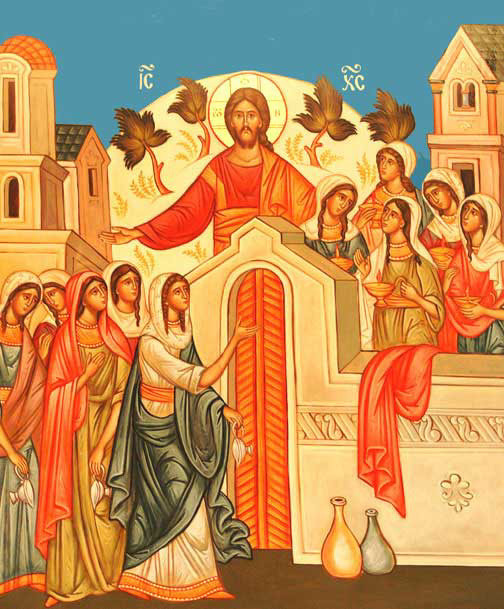
Great and Holy Tuesday
Commemorated on April 30
MONDAY, TUESDAY, WEDNESDAY: THE END
These three days, which the Church calls Great and Holy have within the liturgical development of the Holy Week a very definite purpose. They place all its celebrations in the perspective of End Times; they remind us of the eschatological meaning of Pascha. So often Holy Week is considered one of the “beautiful traditions” or “customs,” a self-evident “part” of our calendar. We take it for granted and enjoy it as a cherished annual event which we have “observed” since childhood, we admire the beauty of its services, the pageantry of its rites and, last but not least, we like the fuss about the Paschal table. And then, when all this is done we resume our normal life. But do we understand that when the world rejected its Savior, when “Jesus began to be sorrowful and very heavy... and his soul was exceedingly sorrowful even unto death,” when He died on the Cross, “normal life” came to its end and is no longer possible. For there were “normal” men who shouted “Crucify Him” who spat at Him and nailed Him to the Cross. And they hated and killed Him precisely because He was troubling their normal life. It was indeed a perfectly “normal” world which preferred darkness and death to light and life.... By the death of Jesus the “normal” world, and “normal” life were irrevocably condemned. Or rather they revealed their true and abnormal inability to receive the Light, the terrible power of evil in them. “Now is the Judgment of this world” (John 12:31). The Pascha of Jesus signified its end to “this world” and it has been at its end since then. This end can last for hundreds of centuries, but this does not alter the nature of time in which we live as the “last time.” “The fashion of this world passeth away...” (I Cor. 7:31).
Pascha means passover, passage. The feast of Passover was for the Jews the annual commemoration of their whole history as salvation, and of salvation as passage from the slavery of Egypt into freedom, from exile into the promised land. It was also the anticipation of the ultimate passage—into the Kingdom of God. And Christ was the fulfillment of Pascha. He performed the ultimate passage: from death into life, from this “old world” into the new world into the new time of the Kingdom. And he opened the possibility of this passage to us. Living in “this world” we can already be “not of this world,” i.e. be free from slavery to death and sin, partakers of the “world to come.” But for this we must also perform our own passage, we must condemn the old Adam in us, we must put on Christ in the baptismal death and have our true life hidden in God with Christ, in the “world to come....”
And thus Easter is not an annual commemoration, solemn and beautiful, of a past event. It is this Event itself shown, given to us, as always efficient, always revealing our world, our time, our life as being at their end, and announcing the Beginning of the new life.... And the function of the three first days of Holy Week is precisely to challenge us with this ultimate meaning of Pascha and to prepare us to the understanding and acceptance of it.
1. This eschatological (which means ultimate, decisive, final) challenge is revealed, first, in the common troparion of these days:
Troparion—Tone 8
Behold the Bridegroom comes at midnight,
And blessed is the servant whom He shall find watching,
And again unworthy is the servant whom He shall find heedless.
Beware, therefore, O my soul, do not be weighed down with sleep,
Lest you be given up to death and lest you be shut out of the Kingdom.
But rouse yourself crying: Holy, Holy, Holy, are You, O our God!
Through the Theotokos have mercy on us!
Midnight is the moment when the old day comes to its end and a new day begins. It is thus the symbol of the time in which we live as Christians. For, on the one hand, the Church is still in this world, sharing in its weaknesses and tragedies. Yet, on the other hand, her true being is not of this world, for she is the Bride of Christ and her mission is to announce and to reveal the coming of the Kingdom and of the new day. Her life is a perpetual watching and expectation, a vigil pointed at the dawn of this new day. But we know how strong is still our attachment to the “old day,” to the world with its passions and sins. We know how deeply we still belong to “this world.” We have seen the light, we know Christ, we have heard about the peace and joy of the new life in Him, and yet the world holds us in its slavery. This weakness, this constant betrayal of Christ, this incapacity to give the totality of our love to the only true object of love are wonderfully expressed in the exapostilarion of these three days:
“Thy Bridal Chamber I see adorned, O my Savior
And I have no wedding garment that I may enter,
O Giver of life, enlighten the vesture of my soul
And save me.”
2. The same theme develops further in the Gospel readings of these days. First of all, the entire text of the four Gospels (up to John 13: 31) is read at the Hours. This recapitulation shows that the Cross is the climax of the whole life and ministry of Jesus, the Key to their proper understanding. Everything in the Gospel leads to this ultimate hour of Jesus and everything is to be understood in its light. Then, each service has its special Gospel lesson.
On Tuesday:
At Matins: Matthew 22: 15-23, 39. Condemnation of Pharisees, i.e. of the blind and hypocritical religion, of those who think they are the leaders of man and the light of the world, but who in fact “shut up the Kingdom of heaven to men.”
At the Presanctified Liturgy: Matthew 24: 36-26, 2. The End again and the parables of the End: the ten wise virgins who had enough oil in their lamps and the ten foolish ones who were not admitted to the bridal banquet; the parable of ten talents “. . . Therefore be ye also ready, for in such an hour as ye think not the Son of Man cometh.” And, finally the Last Judgment.
3. These Gospel lessons are explained and elaborated in the hymnology of these days: the stichiras and the triodia (short canons of three odes each sung at Matins). One warning, one exhortation runs through all of them: the end and the judgment are approaching, let us prepare for them:
“Behold, O my soul, the Master has conferred on thee a talent
Receive the gift with fear;
Lend to him who gave; distribute to the poor
And acquire for thyself thy Lord as thy Friend;
That when He shall come in glory,
Thou mayest stand on His right hand
And hear His blessed voice:
Enter, my servant, into the joy of thy Lord.”
(Tuesday Matins)
4. Throughout the whole Lent the two books of the Old Testament read at Vespers were Genesis and Proverbs. With the beginning of Holy Week they are replaced by Exodus and Job. Exodus is the story of Israel’s liberation from Egyptian slavery, of their Passover. It prepares us for the understanding of Christ’s exodus to His Father, of His fulfillment of the whole history of salvation. Job, the Sufferer, is the Old Testament icon of Christ. This reading announces the great mystery of Christ’s sufferings, obedience and sacrifice.
5. The liturgical structure of these three days is still of the Lenten type. It includes, therefore, the prayer of Saint Ephrem the Syrian with prostrations, the augmented reading of the Psalter, the Liturgy of the Presanctified Gifts and the Lenten liturgical chant. We are still in the time of repentance, for repentance alone makes us partakers of the Pascha of Our Lord, opens to us the doors of the Paschal banquet. And then, on Great and Holy Wednesday, as the last Liturgy of the Presanctified Gifts is about to be completed, after the Holy Gifts have been removed from the altar, the priest reads for the last time the Prayer of Saint Ephrem. At this moment, the preparation comes to an end. The Lord summons us now to His Last Supper.
by THE VERY REV. ALEXANDER SCHMEMANN
4 notes
·
View notes
Text

2nd April >> Mass Readings (USA)
Easter Tuesday
(Liturgical Colour: White. Year: B(II))
First Reading
Acts of the Apostles 2:36–41
Repent and be baptized, every one of you, in the name of Jesus.
On the day of Pentecost, Peter said to the Jewish people, “Let the whole house of Israel know for certain that God has made him both Lord and Christ, this Jesus whom you crucified.”
Now when they heard this, they were cut to the heart, and they asked Peter and the other Apostles, “What are we to do, my brothers?” Peter said to them, “Repent and be baptized, every one of you, in the name of Jesus Christ, for the forgiveness of your sins; and you will receive the gift of the Holy Spirit. For the promise is made to you and to your children and to all those far off, whomever the Lord our God will call.” He testified with many other arguments, and was exhorting them, “Save yourselves from this corrupt generation.” Those who accepted his message were baptized, and about three thousand persons were added that day.
The Word of the Lord
R/ Thanks be to God.
Responsorial Psalm
Psalm 33:4–5, 18–19, 20, 22
R/ The earth is full of the goodness of the Lord.
or
R/ Alleluia.
Upright is the word of the LORD,
and all his works are trustworthy.
He loves justice and right;
of the kindness of the LORD the earth is full.
R/ The earth is full of the goodness of the Lord.
or
R/ Alleluia.
See, the eyes of the LORD are upon those who fear him,
upon those who hope for his kindness,
To deliver them from death
and preserve them in spite of famine.
R/ The earth is full of the goodness of the Lord.
or
R/ Alleluia.
Our soul waits for the LORD,
who is our help and our shield.
May your kindness, O LORD, be upon us
who have put our hope in you.
R/ The earth is full of the goodness of the Lord.
or
R/ Alleluia.
Sequence
Victimae Paschali Laudes
Christians, to the Paschal Victim
Offer your thankful praises!
A Lamb the sheep redeems;
Christ, who only is sinless,
Reconciles sinners to the Father.
Death and life have contended in that combat stupendous:
The Prince of life, who died, reigns immortal.
Speak, Mary, declaring
What you saw, wayfaring.
“The tomb of Christ, who is living,
The glory of Jesus’ resurrection;
bright angels attesting,
The shroud and napkin resting.
Yes, Christ my hope is arisen;
to Galilee he goes before you.”
Christ indeed from death is risen, our new life obtaining.
Have mercy, victor King, ever reigning!
Amen. Alleluia.
Gospel Acclamation
Psalm 118:24
Alleluia, alleluia.
This is the day the LORD has made;
let us be glad and rejoice in it.
Alleluia, alleluia.
Gospel
John 20:11–18
I have seen the Lord, and he said these things to me.
Mary Magdalene stayed outside the tomb weeping. And as she wept, she bent over into the tomb and saw two angels in white sitting there, one at the head and one at the feet where the Body of Jesus had been. And they said to her, “Woman, why are you weeping?” She said to them, “They have taken my Lord, and I don’t know where they laid him.” When she had said this, she turned around and saw Jesus there, but did not know it was Jesus. Jesus said to her, “Woman, why are you weeping? Whom are you looking for?” She thought it was the gardener and said to him, “Sir, if you carried him away, tell me where you laid him, and I will take him.” Jesus said to her, “Mary!” She turned and said to him in Hebrew, “Rabbouni,” which means Teacher. Jesus said to her, “Stop holding on to me, for I have not yet ascended to the Father. But go to my brothers and tell them, ‘I am going to my Father and your Father, to my God and your God.’” Mary went and announced to the disciples, “I have seen the Lord,” and then reported what he had told her.
The Gospel of the Lord
R/ Praise to you, Lord Jesus Christ.
2 notes
·
View notes
Text
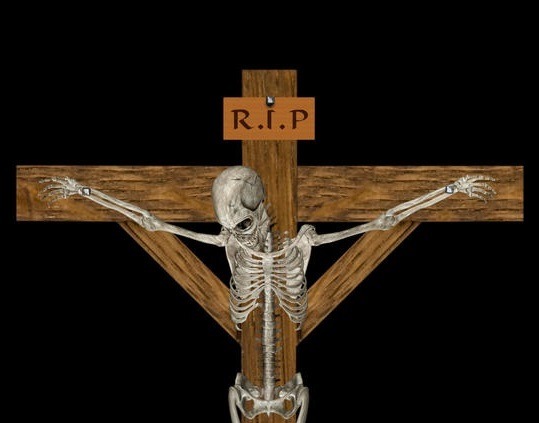
And even when you were dead in transgression and the uncircumcision of your flesh, He brought you to life along with Him, having forgiven us all our transgressions; obliterating the bond against us, with its legal claims, which was opposed to us, He also removed it from our midst, nailing it to the Cross.
- The Letter of Saint Paul to the Colossians (2:13-14)
The elaborate metaphor here about how God canceled the legal claims against us through Christ's cross depicts not Christ being nailed to the cross by men, but "the bond … with its legal claims" being nailed to the cross by God.
- The New American Bible, Revised Edition's commentary on the above passage of Scripture.
St. Paul saw death as the "wages of sin" (Rom. 6:25). For love of us, Jesus made himself "sin" (2 Cor 5:21), "a curse" (Gal 3:13). The "double," which became the object of divine justice, is "sin," as personalized by St. Paul; it is the whole humanity of the "old man" which was crucified, that the sinful body might be destroyed (Rom 6:6). All of humanity was condemned upon the cross, and Christ set aside the decree of condemnation, nailing it to the cross (Col 2:14).
- Giulio Basetti-Sani, O.F.M. (The Koran in the Light of Christ: A Christian Interpretation of the Sacred Book of Islam, page 173), trans. W. Russell Carroll, O.F.M., and Bede Dauphinee, O.F.M.
You cancelled our condemnation by nailing it to the Cross,
—free us from our chains and lead us out of darkness.
- from the Catholic Liturgy of the Hours, Evening Prayer intercessions for the Tuesday of the Third Week of Easter.
#Crucifixion#Jesus Christ#Catholicism#Christianity#prayers#sin#redemption#Saint Paul#death#2 Corinthians#Epistle to the Romans#Letter to the Galatians#Letter to the Colossians
11 notes
·
View notes